人教版九年级英语第十三单元知识点总结
人教版九年级英语unit13知识点归纳
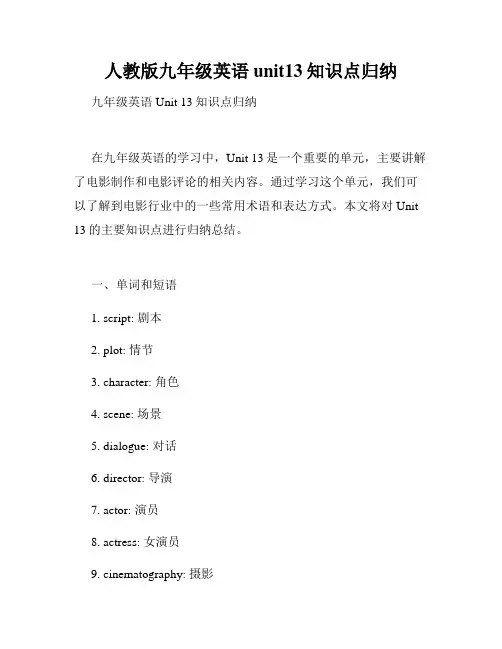
人教版九年级英语unit13知识点归纳九年级英语Unit 13知识点归纳在九年级英语的学习中,Unit 13是一个重要的单元,主要讲解了电影制作和电影评论的相关内容。
通过学习这个单元,我们可以了解到电影行业中的一些常用术语和表达方式。
本文将对Unit 13的主要知识点进行归纳总结。
一、单词和短语1. script: 剧本2. plot: 情节3. character: 角色4. scene: 场景5. dialogue: 对话6. director: 导演7. actor: 演员8. actress: 女演员9. cinematography: 摄影10. special effects: 特效11. soundtrack: 配乐12. box office: 票房13. premiere: 首映式14. sequel: 续集15. genre: 类型二、句型和语法1. 形容词比较级和最高级:例如"The film is more interesting than I expected."和"This is the best movie I've ever seen."2. 定语从句:例如"The actor who played the main character did a great job."3. 被动语态:例如"The film was directed by a famous filmmaker."4. 特殊疑问句:例如"What do you think of the actress in the movie?"5. 宾语从句:例如"He asked me what I thought of the film."三、听力技巧1. 听清语音:要注意区分不同的发音,特别是元音和辅音的区别。
九年级人教版英语unit13知识点
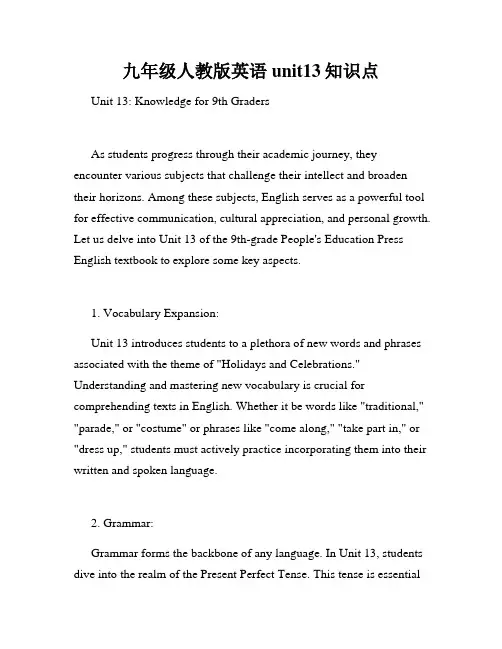
九年级人教版英语unit13知识点Unit 13: Knowledge for 9th GradersAs students progress through their academic journey, they encounter various subjects that challenge their intellect and broaden their horizons. Among these subjects, English serves as a powerful tool for effective communication, cultural appreciation, and personal growth. Let us delve into Unit 13 of the 9th-grade People's Education Press English textbook to explore some key aspects.1. Vocabulary Expansion:Unit 13 introduces students to a plethora of new words and phrases associated with the theme of "Holidays and Celebrations." Understanding and mastering new vocabulary is crucial for comprehending texts in English. Whether it be words like "traditional," "parade," or "costume" or phrases like "come along," "take part in," or "dress up," students must actively practice incorporating them into their written and spoken language.2. Grammar:Grammar forms the backbone of any language. In Unit 13, students dive into the realm of the Present Perfect Tense. This tense is essentialfor expressing actions that have occurred in the past but have a connection to the present. Through examples such as "I have seen this movie before" or "She has already finished her homework," students learn to convey experiences, accomplishments, and unfinished actions in a concise manner.3. Reading Comprehension:Reading comprehension is a crucial skill for students to cultivate. In this unit, students explore various texts related to holidays and celebrations. They learn to identify main ideas, infer meaning from context, and analyze the author's purpose. By practicing comprehension strategies, such as skimming and scanning, students improve their ability to extract information efficiently from written texts.4. Listening Skills:Effective listening skills are invaluable for successful communication. Unit 13 provides ample listening activities that challenge students' ability to understand spoken English from different accents and contexts. By engaging in various tasks, such as listening for specific details or completing gaps in a transcript, students develop their auditory processing skills, sharpen their focus, and enhance their overall listening comprehension.5. Speaking and Presentation:In Unit 13, emphasis is placed on developing students' speaking and presentation skills. Through interactive activities like group discussions, role-plays, and presentations, students gain confidence in expressing their opinions, supporting their arguments, and engaging in meaningful conversations. These exercises help students break free from the fear of making mistakes and foster an environment of active participation and collaboration.6. Writing Skills:Writing is a cornerstone of effective communication. In this unit, students refine their writing skills by crafting compositions centered around holidays and celebrations. They learn to organize their ideas coherently, incorporate appropriate vocabulary and grammar, and craft engaging introductions and conclusions. Through practice and feedback, students gain the necessary skills to express themselves in writing effectively.Unit 13 of the 9th-grade People's Education Press English textbook provides a comprehensive framework for students to acquire language proficiency, critical thinking skills, and cultural awareness. By expanding vocabulary, understanding grammar concepts, developing reading comprehension, honing listening skills, enhancing speaking andpresentation abilities, and refining writing skills, students embark on a journey of linguistic growth and self-expression. With dedication, perseverance, and guidance from their teachers, students can harness the power of Unit 13 to become confident English speakers, writers, and global citizens.。
人教版九年级英语Unit13单词、课文,知识梳理,词汇句式精讲
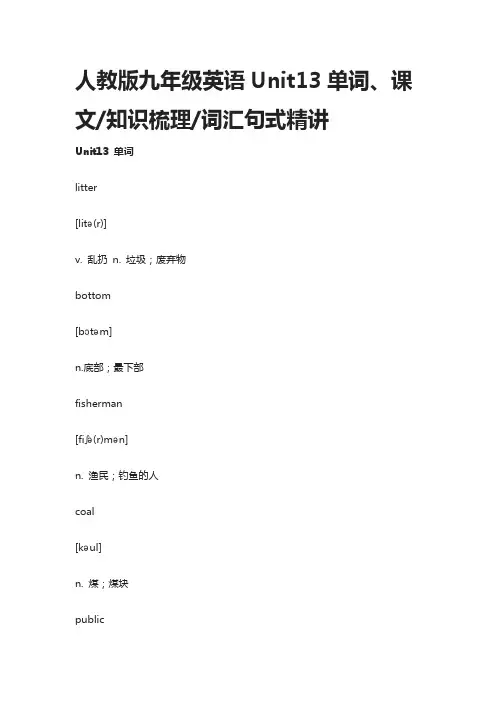
人教版九年级英语Unit13单词、课文/知识梳理/词汇句式精讲Unit13 单词litter[litə(r)]v. 乱扔n. 垃圾;废弃物bottom[bɔtəm]n.底部;最下部fisherman[fiʃə(r)mən]n. 渔民;钓鱼的人coal[kəul]n. 煤;煤块public[p ʌblik]adj. 公众的;公共的n. 民众;百姓ugly[ ʌgli]adj. 丑陋的;难看的advantage[ ədva:ntidʒ]n. 优点;有利条件cost[kɔst; kɔ:st]v. 花费n. 花费;价钱wooden[wudn]adj. 木制的;木头的plastic[plæstik]adj. 塑料的n. 塑料;塑胶make a difference有关系,作用,影响shark[ ʃa:(r)k]n. 鲨鱼fin[fin]n.(.鱼)鳍cut off割掉;砍掉method[meθəd]n. 方法;措施cruel[kru:əl]adj. 残酷的;残忍的harmful[ha:(r)mfl]adj. 有害的chain[tʃein]n. 链子;链条ecosystem[i:kəusistəm]n.生态系统low[ləu[ a(.数量等)减少的;低的;矮的industry[indəstri]n. 工业;行业law[lɔ:]n. 法律;法规reusable[ri:ju:zəbl]adj.可重复使用的;可再次使用的afford[əfɔ:(r)d]v. 承担得起(后果);买得起transportation[t ænspɔ:(r)teiʃn]n. 运输业;交通运输recycle[ri:saikl]v. 回收利用;再利用napkin[næpkin]n. 餐巾;餐巾纸upside down颠倒;倒转gate[geIt]n. 大门bottle[bɔtl]n. 瓶;瓶子president[prezidənt]n. 负责人;主席;总统inspiration[inspəreiʃn]n. 灵感;鼓舞人心的人(或事物)metal[metl]n. 金属creativity[kri:eitivəti]n. 创造力;独创性WildAid[waildeid]野生救援协会(美国)WWF(World Wide Fund For Nature) 世界自然基金会Mark[ma:(r)k]马克(男名)Jason[dʒeisən]贾森(男名)Ken [ken]肯(男名)Hayes [heiz]海斯(姓)Jessica[dʒesikə]杰茜卡(女名)Unit13 知识梳理【重点短语】1. at the bottom of the river 在河床底部2. be full of the rubbish 充满了垃圾3. throw litter into the river 把垃圾扔入河中4. play a part in cleaning it up 尽一份力把它清理干净5. land pollution 土地污染6. fill the air with black smoke 使空气中充满了黑烟7. cut down air pollution 减少空气污染8. make a difference 产生影响17. take action 采取行动18. turn off 关掉19. pay for 付费20. add up 累加21. use public transportation 使用公共交通22. recycle books and paper 回收书和废纸23. use paper napkins 使用纸巾24. turn off the shower 关掉喷头25. ride in cars 开车出行【重点句型】1.Even the bottom of the river was full of rubbish.即使河底都充满垃圾。
最新人教版初中英语九年级第13单元知识讲解
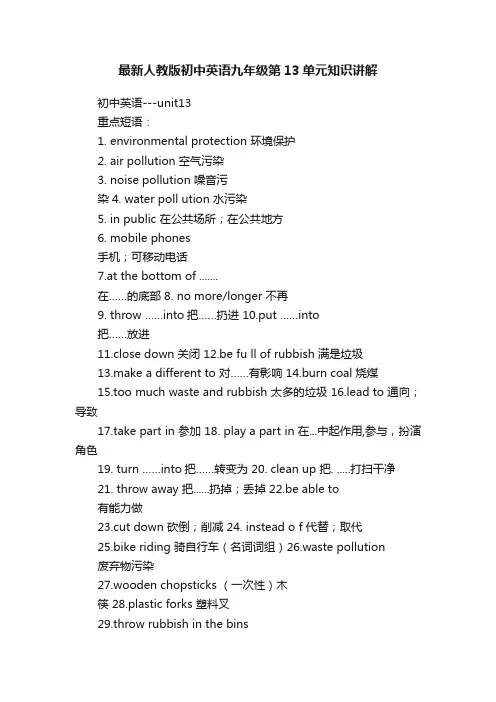
最新人教版初中英语九年级第13单元知识讲解初中英语---unit13重点短语:1. environmental protection 环境保护2. air pollution 空气污染3. noise pollution 噪音污染 4. water poll ution 水污染5. in public 在公共场所;在公共地方6. mobile phones手机;可移动电话7.at the bottom of .......在……的底部 8. no more/longer 不再9. throw ……into把……扔进10.put ……into把……放进11.close down 关闭 12.be fu ll of rubbish 满是垃圾13.make a different to 对……有影响 14.burn coal 烧煤15.too much waste and rubbish 太多的垃圾 16.lead to 通向;导致17.take part in 参加 18. play a part in 在...中起作用,参与,扮演角色19. turn ……into把……转变为 20. clean up 把. .....打扫干净21. throw away 把......扔掉;丢掉 22.be able to有能力做23.cut down 砍倒;削减 24. instead o f 代替;取代25.bike riding 骑自行车(名词词组)26.waste pollution废弃物污染27.wooden chopsticks (一次性)木筷 28.plastic forks 塑料叉29.throw rubbish in the bins把垃圾扔进箱里 30.keep public places clean保持公共场所干净31.hear of/about 听说32.a bowl of shark fin soup 一碗鱼翅汤33.in southern China 在中国的南部 34.cut off 切除35.throw back into 扔回 36.be harmfu l to……对……有害37.at the top of 在……的顶部38. not only ...b ut also …不仅......而且......39. the food chain in the oce an’s ecosystem 海洋生态系统中的食物链40. in the last 20 to 30 yea rs. 在过去的20至30年中41.develop laws to stop the sa le of shark fin健全法律去阻止鱼鳍买卖42. environmental protection gro ups around the world 全球环境保护组织43.so far 当目前为止,迄今为止 44. scientific studies 科学研究45.be against (doing)反对做...46. can’t afford to do sth 不能承担做某事47.take action 采取行动 48. add up把......加起来;加起来49. ride in cars 开车出行 50.recycle books and paper 回收书和废纸51.put sth to good use 好好利用52.build sth .out of…用......来建造某物53. be an inspiration to sb成为某人的榜样 54. bring back 恢复;使想起重点句型:1. We’re trying to save the earth! 我们正在竭尽全力拯救地球!2. Here are some words relat ed to different kinds of pollution .这儿有几个与不同种类的污染有关的词汇。
人教版英语九年级全册单元unit 13 知识点+测试卷+思维导图
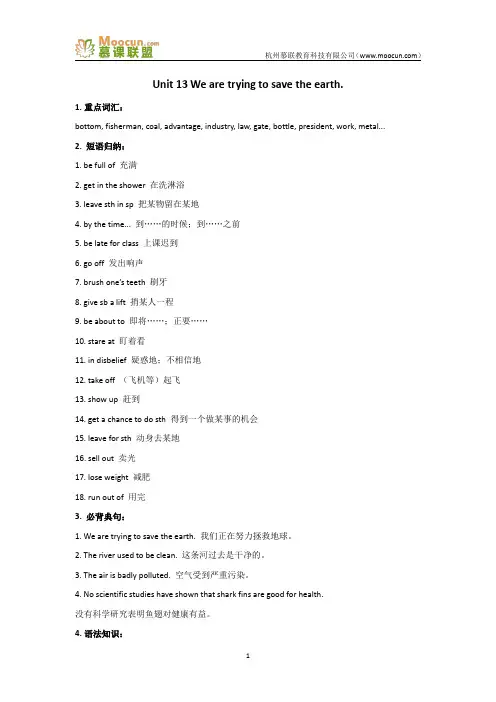
Unit 13 We are trying to save the earth.1.重点词汇:bottom, fisherman, coal, advantage, industry, law, gate, bottle, president, work, metal...2. 短语归纳:1. be full of 充满2. get in the shower 在洗淋浴3. leave sth in sp 把某物留在某地4. by the time... 到……的时候;到……之前5. be late for class 上课迟到6. go off 发出响声7. brush one’s teeth 刷牙8. give sb a lift 捎某人一程9. be about to 即将……;正要……10. stare at 盯着看11. in disbelief 疑惑地;不相信地12. take off (飞机等)起飞13. show up 赶到14. get a chance to do sth 得到一个做某事的机会15. leave for sth 动身去某地16. sell out 卖光17. lose weight 减肥18. run out of 用完3. 必背典句:1. We are trying to save the earth. 我们正在努力拯救地球。
2. The river used to be clean. 这条河过去是干净的。
3. The air is badly polluted. 空气受到严重污染。
4. No scientific studies have shown that shark fins are good for health.没有科学研究表明鱼翅对健康有益。
4.语法知识:英语句子成分分析组成句子的各个部分叫做句子成分。
它包括:主语、谓语、宾语、定语、状语、表语和宾语补足语等。
人教版英语九年级Unit13单元知识点归纳
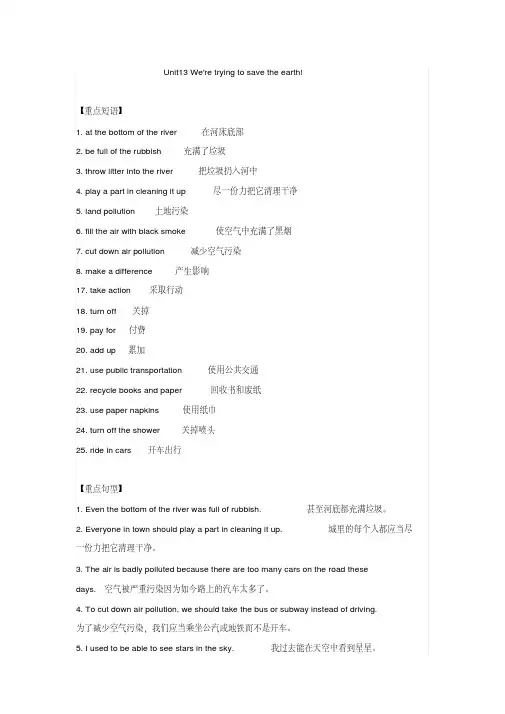
Unit13 We're trying to save the earth!【重点短语】1. at the bottom of the river 在河床底部2. be full of the rubbish 充满了垃圾3. throw litter into the river 把垃圾扔入河中4. play a part in cleaning it up 尽一份力把它清理干净5. land pollution 土地污染6. fill the air with black smoke 使空气中充满了黑烟7. cut down air pollution 减少空气污染8. make a difference 产生影响17. take action 采取行动18. turn off 关掉19. pay for 付费20. add up 累加21. use public transportation 使用公共交通22. recycle books and paper 回收书和废纸23. use paper napkins 使用纸巾24. turn off the shower 关掉喷头25. ride in cars 开车出行【重点句型】1. Even the bottom of the river was full of rubbish. 甚至河底都充满垃圾。
2. Everyone in town should play a part in cleaning it up. 城里的每个人都应当尽一份力把它清理干净。
3. The air is badly polluted because there are too many cars on the road thesedays. 空气被严重污染因为如今路上的汽车太多了。
4. To cut down air pollution, we should take the bus or subway instead of driving.为了减少空气污染,我们应当乘坐公汽或地铁而不是开车。
完整版人教版九年级英语第十三单元知识点总结
人教版九年级英语第十三单元知识点总结Unit13.We're trying to save the earth!一.单词litter bottom fisherman coal ugly advantage cost wooden plastic takeaway bin shark fin cruel harmful be harmful to at the top of chain the food chain ecosystem industry law scientific takepart in afford turn off reusable pay for take action transportation recycle napkin throw away putsth to good use pull...down upside gate bottle president inspiration iron work metal bring backcreativity二.1.现在进行时定义:表示说话时(瞬间)正在进行的动作,也表示目前或现阶段一直进行的动作。
结构: ①肯定句: 主语+ am/is/are + V-ing②否定句: 主语+ am/is/are + not + V-ing③疑问句: Am/Is/Are + 主语+ V-ing用法:1)表示说话时正在进行的,目前正在发生的动作。
①Look! The big bird is flying away. ②He is watching a movie now.2)表示目前一段时间内正在进行,但说话时可能没有进行的动作。
Right now I am studying Chinese by distance learning. 我现在正通过远程教育学习汉语。
1) 2)常带有表示目前时刻的时间副词, 如:now, right now, at the (very) moment, for the time being, at present, these days 及Look! Listen! ...3)与always, constantly, forever, all the time等副词连用,表示动作反复或习惯。
人教版九年级英语Unit13单元知识点梳理
一、短语:1.at the bottom of the river在河的底部2.be full of the rubbish充满了垃圾3.throw litter into the river把垃圾扔入河中4.play a part in尽一份力...nd pollution土地污染6.cut down air pollution减少空气污染7.make a difference产生影响8.take action采取行动9.ride in cars开车出行10.add up累加e public transportation使用公共交通12.recycle books and paper回收书和废纸e paper napkins使用纸巾14.turn off the shower关掉喷头15.fill the air with black smoke使空气中充满了黑烟二、知识点:1.not only...but also...的用法:(1)not only…but also…意为“不仅……而且……”,用于连接两个表示并列关系的成分,着重强调后者,其中的also有时可以省略。
如:She not only plays well,but also writes music.她不仅很会演奏,而且还会作曲。
He not only writes his own plays,he also acts in them.他不仅是自编剧本,还饰演其中的角色。
He works not only on weekdays but on Sundays as well.他不仅平时工作,星期日也工作。
(2)若连接两个成分作主语,其谓语通常与靠近的主语保持一致,即就近原则。
如:Not only you but also he has to leave.不只是你,他也得离开。
(3)若连接两个句子,not only后面的句子要用倒装,如:Not only did he speak more correctly,but he spoke more easily.他不仅说得更正确,而且讲得更不费劲了。
人教新目标九年级英语Unit13知识点总结复习(Word版)
Unit 13 W e’re trying to save the earth!知识点总结词汇过关1.v. 乱扔n. 垃圾;废弃物2. n. 底部;最下部4. n. 煤;煤块5.adj. 公众的;公共的n. 民众;百姓6.adj. 丑陋的;难看的7.n. 优点;有利条件8. v. 花费n. 花费;价钱9.adj. 木制的;木头的10.adj. 塑料的n. 塑料;塑胶11. 有关系,作用,影响12. n. 鲨鱼13. n(.鱼)鳍14.(短语)割掉;砍掉15. n. 方法;措施16. adj. 残酷的;残忍的17. adj. 有害的18. n. 链子;链条19. n. 生态系统20.adj(.数量等)减少的;低的;矮的21. n. 工业;行业22. n. 法律;法规23. adj.可重复使用的;可再次使用的24. v. 承担得起(后果);买得起25. n. 运输业;交通运26. v. 回收利用;再利用27. n. 餐巾;餐巾纸28.(短语)颠倒;倒转29.n. 大门30.n. 瓶;瓶子31.n. 负责人;主席;总统32. n. 灵感;鼓舞人心的人(或事物33.n. 金属34.n. 创造力;独创性一.本单元语法复习:(1)现在进行时(1)含义:表示正在发生或进行的动作。
(2)基本结构:主语+ be + 现在分词(be 的形式随主语的变化而变化)(3)基本用法:①表示现在正在进行的动作。
特征:常常与now或具体的时间连用,有时句中会有感官动词来提示,或通过上下文来暗示。
②表示现阶段一直进行的动作。
这类动词常常是延续性动词。
常于at present, this week, these days等连用。
③表示主语的特征、性格、能力等(2)现在完成时(1)含义:表示过去发生的动作对现在还有影响。
(2)基本结构:主语+ have / has + 过去分词(3)基本用法:①表示过去发生的动作,但强调对现在产生影响。
人教版九年级unit13知识点
人教版九年级unit13知识点人教版九年级Unit 13 知识点Unit 13的知识点主要涵盖了三个方面:句子结构、词汇与语法。
下面将分别进行介绍。
一、句子结构1. 简单句:一个完整的句子,包含一个主语和一个谓语。
例:We watched a football match yesterday.(我们昨天看了一场足球比赛。
)2. 并列句:由两个或多个独立的简单句连接而成,它们之间用逗号或者连接词(如and,but,or等)进行分隔。
例:I like playing basketball, and my brother likes playing soccer.(我喜欢打篮球,而我哥喜欢踢足球。
)3. 复合句:一个完整的句子,由一个或多个主句和一个或多个从句组成。
例:Although it was raining, we still went hiking.(虽然下雨了,但我们还是去爬山了。
)二、词汇1. 人称代词:第一人称(I,we),第二人称(you),第三人称(he,she,it,they)。
例:He is my best friend.(他是我最好的朋友。
)2. 形容词:用于描述名词或代词的特征或属性。
例:The beautiful flowers are in bloom.(美丽的花儿已经开放了。
)3. 副词:修饰动词、形容词或其他副词,用于表示时间、地点、原因等。
例:She runs very fast.(她跑得非常快。
)4. 动词:表示动作、状态或存在的词。
例:They are swimming in the pool.(他们正在游泳池里游泳。
)三、语法1. 一般现在时:表示经常性或习惯性的动作。
例:I always go to bed early.(我总是早睡。
)2. 一般过去时:表示过去发生的动作或状态。
例:She finished her homework last night.(她昨晚完成了她的作业。
- 1、下载文档前请自行甄别文档内容的完整性,平台不提供额外的编辑、内容补充、找答案等附加服务。
- 2、"仅部分预览"的文档,不可在线预览部分如存在完整性等问题,可反馈申请退款(可完整预览的文档不适用该条件!)。
- 3、如文档侵犯您的权益,请联系客服反馈,我们会尽快为您处理(人工客服工作时间:9:00-18:30)。
人教版九年级英语第十三单元知识点总结Unit13.We ’re trying to save the earth!一.单词litter bottom fisherman coal ugly advantage cost wooden plastic takeaway bin shark fin cruel harmful be harmful to at the top of chain the food chain ecosystem industry law scientific take part in afford turn off reusable pay for take action transportation recycle napkin throw away putsth to good use pull...down upside gate bottle president inspiration iron work metal bring back creativity二. 1.现在进行时定义:表示说话时(瞬间)正在进行的动作,也表示目前或现阶段一直进行的动作。
结构 : ①肯定句 : 主语+ am/is/are + V-ing②否定句 : 主语+ am/is/are + not + V-ing③疑问句 : Am/Is/Are +主语+ V-ing用法: 1)表示说话时正在进行的,目前正在发生的动作。
①Look! The big bird is flying away. ② He is watching a movie now.2)表示目前一段时间内正在进行,但说话时可能没有进行的动作。
Right now I am studying Chinese by distance learning.我现在正通过远程教育学习汉语。
1) 2) 常带有表示目前时刻的时间副词 , 如: now, right now, at the (very) moment, for the time being, at present, these days 及 Look! Listen! ...3)与 always, constantly, forever, all the time 等副词连用,表示动作反复或习惯。
此时句子常含有说话者的强烈情感在内。
表达较强的“责备”或“表扬”之意① You are always changing your mind. 你总是主意不定。
(太烦人了 )② He is always helping others. 他总是帮助别人。
(他真是个好人 )4)对于 come, go, leave, arrive, start,fly,drive 等表示位置移动的动词常可用进行时态表将来。
① He is leaving on Wednesday.② Mary isn’there at the moment. She is coming later.ed to do 见第四单元及 use 用法3.被动语态见第五单元注意:接双宾语的词的被动语态;make /let /have sb do的被动语态;see/ hear /notice /find/observe sb do的被动语态;It’ssaid/reported/believed/supposed/well-known;及无被动语态的三种情况(感官动词、不及物动词、sell/write 等)4. 现在完成时 :用法:①过去发生的动作对现在造成的影响或结果:强调结果Yesterday I finished my homework, that ’sto say, I have finished my homework now.②过去已经开始一直持续到现在的动作或状态:强调继续I have lived here since 1990.现在完成时的构成 have/has+过去分词现在完成时的四个基本句型肯定句He has finished the work.否定句He has not finished the work.特殊疑问句What has he done?在下列情形下用现在完成时一般疑问句Has he finished the work?两回答Yes ,he has.No, he hasn’t.1 九词语①already 已经肯定句中或句尾I have already found my pen. = I have found my pen already.②yet 已经否定句和疑问句句尾I have not finished the work yet.Have you bought a computer yet?③ever 曾经句中Have you ever seen pandas?④never 从不句中I have never been to Beijing.⑤just 刚刚句中I have just done my work.⑥before 以前句尾I have never been there before.⑦s o far 到目前为止So far he has learned 200 words.⑧how long 多久How long have you lived here?⑨how many times 多少次How many times has he been to Beijing?2 两词组have<has>gone to 去了某地例: He has gone to Beijing(去了北京,没回 )have<has>been to 去过某地例: He has been to Beijing.(去过北京,回了 )3 两结构for two months for + 一段时间Jim has lived here for 2 months. since last year since +过去时间点Lucy has been in Beijing since 3 years since 3 years ago ago.since 1990since he came here since +过去时态句子He has been in China since he camehere.4如果句子里面没有时间状语,汉语意思能够加“已经”,往往用现在完成时态。
Have you lost your library book?你已经弄丢了从图书馆借的那本书吗?5现在完成时态还常常用于下列句型They have planted many trees in the last/past few years.This is the best book I have ever read.It is the first time I have played the computer games.在现在完成时中,一次性动词不能和一段时间状语连用例: He has bought the book for 3 years. (错)因 buy 这个一次性动词不能和一段时间for 3 years 连用 , 改正的办法有:He has bought the book..(去掉一段时间for 3 years)He bought the book 3 years ago(改为一般过去时,使句子的意思不变)It ’s/It has been 3 years since he bought the book. = 3 years has passed since he bought the book. (改为固定句型 It is/It has been ---since---)He has had the book for 3 years.另外①come/arrive/get to/reach → be here I have come here for 3 years. (错)②l eave/go → be awayHe has left for 3 hours. (错)③begin/start→ be onThe film has begun for 3 minutes. (错)④o pen → be open / close → be closed The shop has opened for 3 years.( 错 )⑤d ie → be deadHis father has died for 3 years.( 错 )⑥finish/end → be over (用延续性动词have 代替 buy)改为: I have been here for 3 years.改为: He has been away for 3 hours.改为: The film has been on for 3 minutes.改为: The shop has been open for 3 years.改为: His father has been dead for 3 years.He has finished the work for 3 days.( 错 )改为: The work has been over for 3 days⑦join I have joined the army for 3 years. (错)改为: I have been in the army for 3 years.或 I have been a soldier for 3 years.⑧buy /catch→ haveI have bought the bike for 3 years. (错)改为: I have had the bike for 3 years.He has caught a cold for 3 days.(错)改为: He has had a cold for 3 days.⑨borrow→ keepI have borrowed the book for 3 years.(错)改为: I have kept the book for 3 years.还有其它的归纳如下:break →be broken get up →be up marry →be married become→ be lose→ be lost5.情态动词1)情态动词本身有一定的词义,表示说话人的情绪、态度或语气,但不能单独作谓语,只能与其他动词构成谓语。
常见的有:can (could), may (might), must, need, shall (should), will (would) 等。
